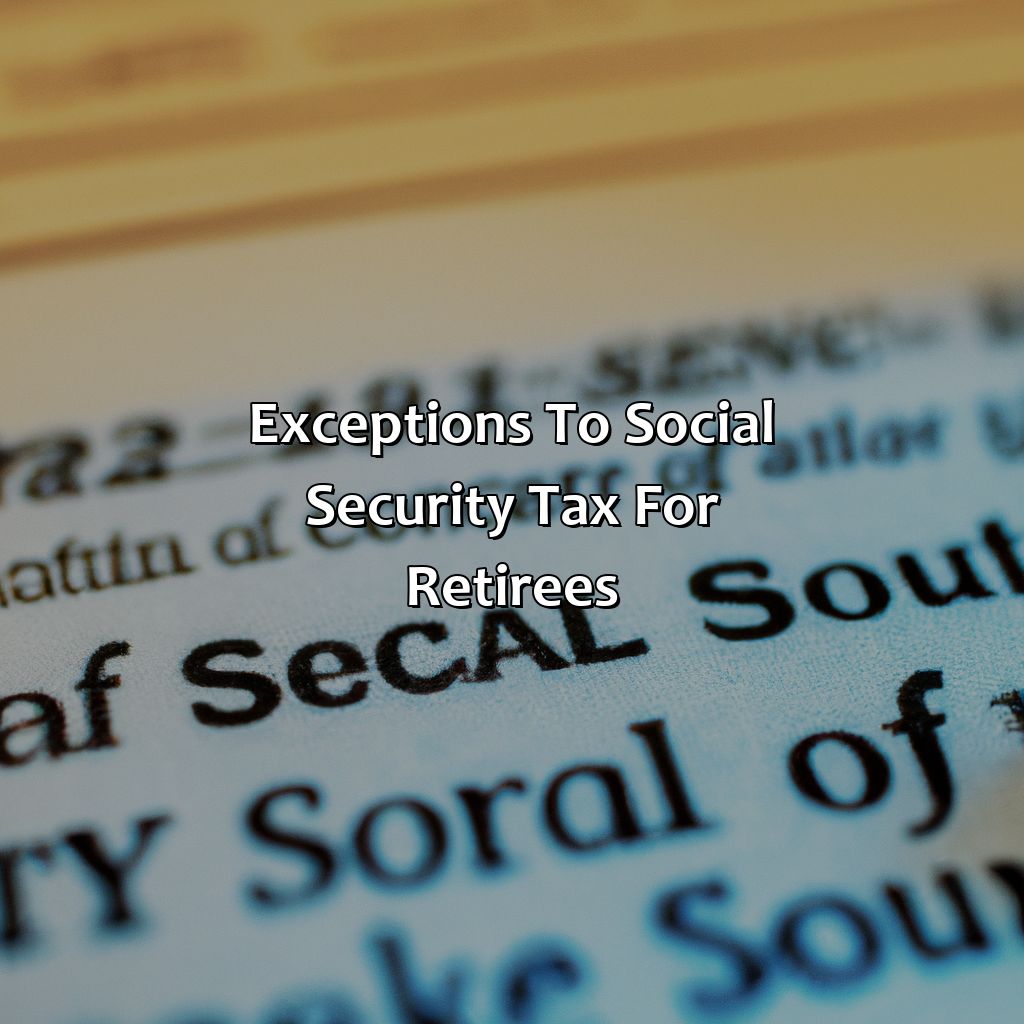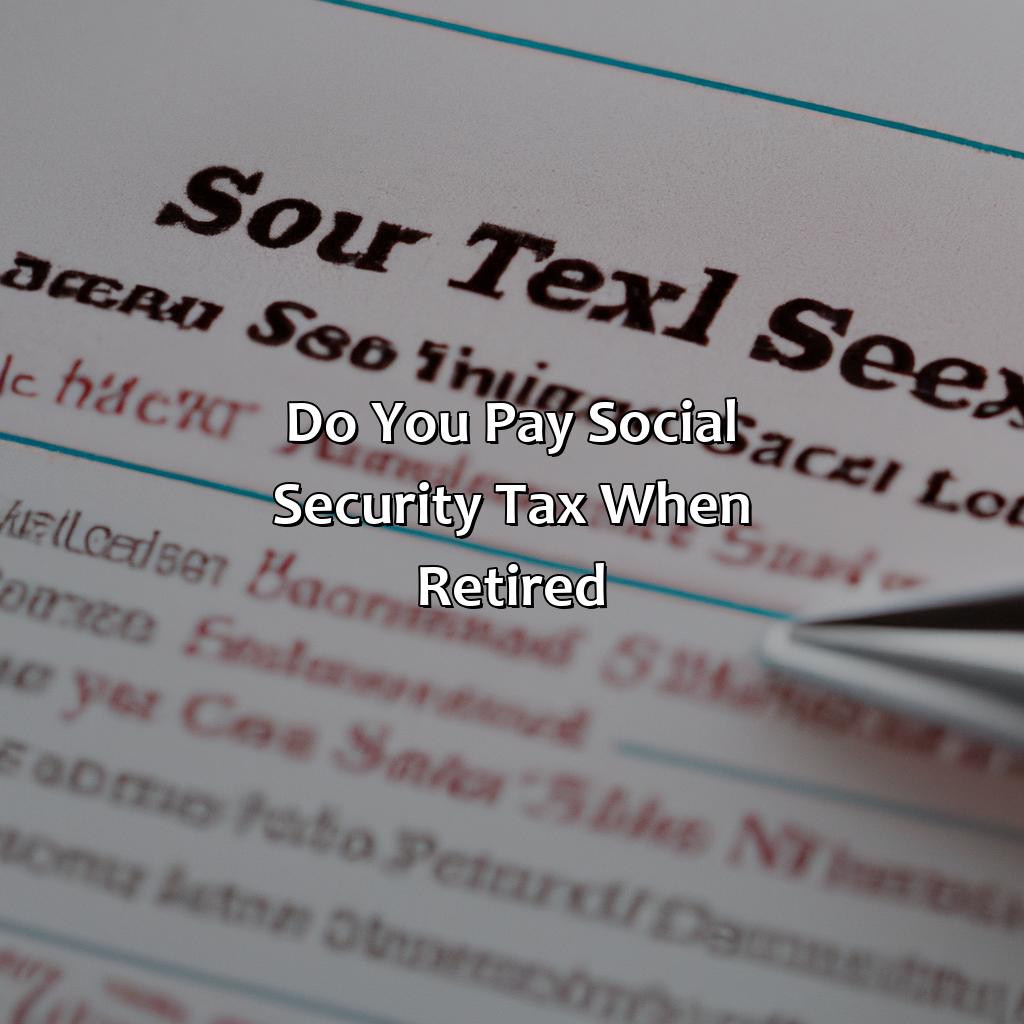Do You Pay Social Security Tax When Retired?
Key Takeaway:
- Social Security tax is a tax on earned income that funds Social Security benefits for retired, disabled, and survivors. Both employees and employers are required to pay Social Security taxes.
- Retirees may have to pay taxes on their Social Security benefits depending on their income. The amount of Social Security tax paid by retirees is determined by their taxable income, which includes not only earnings but also other sources of income such as interest, dividends, and pensions.
- Some exceptions to Social Security tax for retirees include income limits and non-U.S. citizens. Retirees who earn above a certain threshold may have to pay more Social Security taxes, while non-U.S. citizens may be subject to different tax rules depending on their residency status and other factors.
Confused about whether you have to pay social security tax when you retire? You’re not alone. Understanding the rules surrounding social security taxes can be complicated, but this article can help. Let us guide you through the intricacies of social security taxes to ensure you make the right decisions for your retirement.
Social Security Tax: A Quick Overview
Do you want to know what Social Security Tax is and who pays it? To understand it better, let’s break it down into two parts. What is Social Security Tax? And Who Pays Social Security Tax? This will help you have a clear understanding of this tax when you retire.

Image credits: retiregenz.com by Harry Arnold
What is Social Security Tax?
Social Security Tax refers to a payroll tax levied on the income earned by workers in the United States. The tax is collected by the government to help fund various social security programs such as retirement benefits, disability insurance, and survivor benefits.
As an employee, a portion of your income is deducted towards Social Security Tax, which is matched by your employer. Self-employed individuals are also required to pay their share of Social Security Tax.
The amount of Social Security Tax you pay depends on your income level and is capped at a certain amount. For example, in 2021, employees and employers each pay 6.2% of wages up to $142,800 for Social Security Tax. Once you reach this threshold, you no longer have to pay this tax for the rest of the year. However, Medicare taxes will still apply.
It’s important to note that Social Security taxes do not stop when you retire, but the good news is that retirement benefits are available once you reach a certain age or eligibility requirements.
According to the Internal Revenue Service (IRS), “Social Security benefits include monthly retirement, survivor and disability benefits.”
A true fact as per Forbes: Over 64 million Americans received Social Security benefits in 2020.
Social security tax: where the only guaranteed things in life are death, taxes, and the government taking a cut of your retirement funds.
Who Pays Social Security Tax?
Individuals who earn income from employment and self-employment are required to pay social security tax. This tax contributes towards benefits such as retirement, disability, and survivorship. In addition to employees, employers also contribute a portion of the employee’s social security tax.
One cannot evade social security tax by retiring. Even after retiring, if an individual earns any income from working or self-employment, they will be required to pay social security taxes. However, once an individual reaches full retirement age, which is between 66 or 67 years old depending on one’s birth year, there is no longer a limit on how much income they can earn without affecting their social security benefit payments.
It should be noted that some individuals such as certain government employees may be exempt from paying social security taxes due to receiving alternative retirement benefits. To ensure accurate contributions towards social security taxes and benefits received in return, it is essential to maintain up-to-date records of one’s income and employment history.
To minimize the impact of social security taxes on retirement income, individuals can try to maximize their pre-tax contributions towards employer-sponsored retirement plans such as 401(k)s or Individual Retirement Accounts (IRAs). By doing so, they can reduce their taxable income, thereby reducing the amount of Social Security tax owed. Additionally, considering other forms of investments that yield non-taxable or tax-deferred returns can further aid in easing the burden of Social Security taxation during retirement years.
Retirees, get ready to have a portion of your income pried away because even in your golden years, Uncle Sam still needs a cut for Social Security Tax.
Social Security Tax for Retirees
Know how Social Security Tax matters to you as a retiree? Look into the part about Social Security Tax for Retirees in the article ‘Do You Pay Social Security Tax When Retired?’ Here, you can learn if Social Security Tax is taxable and how much is paid.

Image credits: retiregenz.com by Joel Duncun
Is Social Security Taxable?
When you receive Social Security benefits, the Internal Revenue Service (IRS) may tax them if your income exceeds certain thresholds. This is known as the taxation of Social Security benefits. The amount of tax you pay on your benefits depends on your combined income, which includes your adjusted gross income plus any non-taxable interest and half of your Social Security benefits.
If your combined income is between $25,000 and $34,000 for a single individual, or between $32,000 and $44,000 for a married couple filing jointly, up to 50% of your Social Security benefits may be subject to tax. If your combined income is more than $34,000 for a single individual or more than $44,000 for a married couple filing jointly, up to 85% of your Social Security benefits may be subject to tax.
It’s important to keep in mind that not all states impose taxes on Social Security benefits. For example, some states exempt them from state income taxes altogether.
According to the AARP Public Policy Institute, nearly 22% of older Americans rely on their Social Security benefits for all or almost all of their monthly income.
Great news, folks! You only have to pay enough social security tax to fund a small country’s military budget.
How Much Social Security Tax is Paid?
The amount of social security tax paid varies for retirees, depending on their income and age. Those who continue to work or have other sources of income may pay additional taxes. However, those who solely rely on social security benefits may not have to pay any taxes at all.
It is important to understand how the taxation of social security benefits works. Typically, up to 85% of the benefits received are subject to federal income tax if the recipient’s combined income exceeds certain thresholds. However, some states do not tax social security benefits at all.
It’s worth noting that retired individuals who earn income from part-time work or self-employment may also be subject to Social Security tax, even if they are already receiving benefits. This occurs when their total annual earnings exceed a certain limit, which changes each year.
According to a recent AARP study, approximately 50% of all Social Security beneficiaries currently pay taxes on their benefits.
Source: https://www.aarp.org/retirement/social-security/questions-answers/how-is-social-security-taxed.html
Retirement may have its benefits, but being exempt from social security tax isn’t one of them (unless you’re lucky enough to fall under certain exceptions).
Exceptions to Social Security Tax for Retirees
Retirees may be curious if they have to pay Social Security Tax. To help these individuals, here are some solutions.
Income limits for Social Security Tax will be discussed first. This will help people know how much they can make before having to worry about the Tax. Then, the Social Security Tax for non-U.S. citizens will be explored. This will provide an understanding of how the Tax works for non-citizens.

Image credits: retiregenz.com by Harry Washington
Income Limits for Social Security Tax
For individuals who are retired, there are certain income limits for Social Security Tax that must be considered. These limits vary depending on several factors such as age, retirement status and overall income.
Using the table tag, we can create a table to better understand the income limits for Social Security Tax. The table will include columns for age range, filing status, and maximum taxable earnings. For example:
| Age Range | Filing Status | Maximum Taxable Earnings |
|---|---|---|
| Under 65 | Single | $142,800 |
| Under 65 | Married | $284,400 (combined) |
| Over 65 | Single | $147,414 |
| Over 65 | Married | $294,828 (combined) |
It’s important to note that these income limits are subject to change every year based on inflation and other economic factors.
Retirees who have reached full retirement age can earn an unlimited amount of money without having their Social Security benefits reduced or withheld. However, those who retire early and receive benefits before reaching full retirement age may face some restrictions on earnings.
Interestingly enough, Social Security originally only covered retired workers and excluded women and minorities. It wasn’t until amendments were made in the 1950s that people with disabilities were added to the list of covered groups.
Overall, retirees should carefully consider their income limits when it comes to Social Security tax to avoid any penalties or reduction of benefits.
Sorry non-U.S. citizens, the only exception to social security tax for you is if you manage to become a U.S. citizen before retiring. Good luck with that.
Social Security Tax for Non-U.S. Citizens
Non-U.S. Citizens and Social Security Taxes
Foreign individuals who work in the U.S. but aren’t citizens, may be subject to social security tax. However, whether or not a foreigner is required to pay social security tax depends on the type of work visa they hold and any applicable tax agreements between their country of origin and the U.S.
In some cases, foreign workers with certain visas may be exempt from paying social security tax altogether. For example, those holding J-1 exchange visitor visas who conduct research or teach at colleges or universities typically don’t need to pay the tax.
It’s important for non-citizens who work in the U.S. to understand their obligations under U.S. tax law. Seeking professional advice can help ensure compliance while minimizing potential liability.
Some Facts About Social Security Tax When Retired:
- ✅ Social Security tax is still applicable on retirement income. (Source: Investopedia)
- ✅ Retirees may need to pay taxes on their Social Security benefits depending on their income level. (Source: AARP)
- ✅ Up to 85% of a person’s Social Security benefits may be taxed if their combined income exceeds a certain threshold. (Source: IRS)
- ✅ Retirees may be able to reduce their Social Security tax by choosing to receive benefits later or managing their income and deductions strategically. (Source: Kiplinger)
- ✅ Social Security tax is not the same as income tax, and retirees may need to pay both. (Source: U.S. News & World Report)
FAQs about Do You Pay Social Security Tax When Retired?
Do you pay social security tax when retired?
It depends on your income. If you earn more than a certain amount, you may have to pay taxes on your Social Security benefits.
What is the Social Security income limit when retired?
The Social Security income limit for 2021 is $18,960. If you earn more than that amount, you will have to pay taxes on your benefits.
What percentage of Social Security income is taxable when retired?
The percentage of Social Security income that is taxable when retired depends on your modified adjusted gross income (MAGI). If your MAGI is less than $25,000 (single) or $32,000 (married filing jointly), none of your Social Security benefits are taxable. If your MAGI is between $25,000 and $34,000 (single) or $32,000 and $44,000 (married filing jointly), up to 50% of your Social Security benefits are taxable. If your MAGI is over $34,000 (single) or $44,000 (married filing jointly), up to 85% of your Social Security benefits are taxable.
Do some states tax Social Security income when retired?
Yes, some states tax Social Security income when retired. The states that currently tax Social Security income are Connecticut, Colorado, Kansas, Minnesota, Missouri, Montana, Nebraska, New Mexico, North Dakota, Rhode Island, Utah, Vermont, and West Virginia.
What is the best way to avoid paying taxes on Social Security income when retired?
One of the best ways to avoid paying taxes on Social Security income when retired is to reduce your MAGI. You can do this by delaying taking certain retirement distributions or by contributing to tax-deferred retirement accounts, such as a 401(k) or IRA. You may also want to consider moving to a state that does not tax Social Security income.
Is it mandatory to pay taxes on Social Security income when retired?
No, it is not mandatory to pay taxes on Social Security income when retired. However, depending on your income, you may be required to pay taxes on your benefits.


